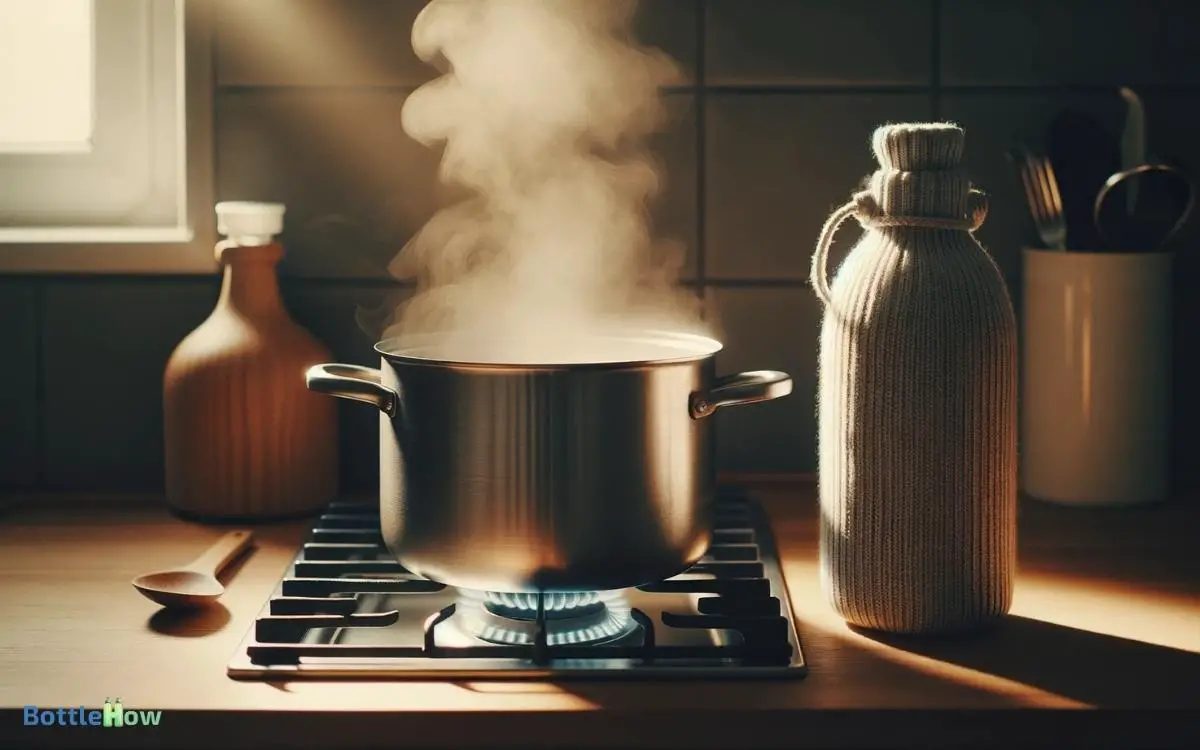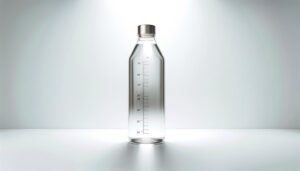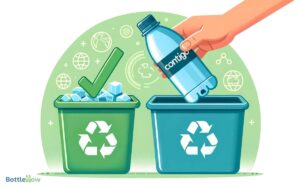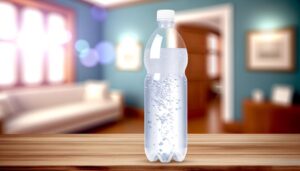Can You Reboil Water From a Hot Water Bottle? A Guide!
You can reboil water from a hot water bottle, but it’s not recommended due to several risks. Reboiling causes chemical changes, increases impurity concentration, and can form harmful compounds. It also depletes dissolved oxygen, affecting water quality.
Repeated heating can degrade the bottle material, causing brittleness and seal failures, leading to health risks from potential leaching chemicals like BPA and phthalates, especially if the bottle is plastic.
Energy efficiency concerns and environmental impacts also make reboiling less favorable. For safer practices and alternatives, understanding these risks in more detail is beneficial.

Key Takeaways
What Happens When You Reboil Water
When you reboil water, its chemical composition can change due to the evaporation of volatile compounds and the concentration of dissolved minerals.
As water boils, some gases like oxygen and carbon dioxide escape, altering the water’s characteristics. The loss of these gases can affect taste and potentially impact the dissolution of other substances.
Additionally, minerals such as calcium and magnesium don’t evaporate and instead become more concentrated.
This increased concentration can lead to the formation of scale deposits, which you might notice as a white residue.
Over time, repeated boiling can accentuate these changes, making the water less ideal for certain uses.
Understanding these processes allows you to make informed decisions about reboiling water and its implications.
Chemical Changes in Reboiled Water
When you reboil water, you increase the concentration of minerals and other dissolved substances.
This can lead to the formation of potentially toxic compounds such as nitrates and arsenic. Understanding these chemical changes is important for evaluating the safety of reboiled water.
Mineral Concentration Increase
Reboiling water in a hot water bottle can lead to an increase in mineral concentration, potentially altering its chemical composition.
As water evaporates during boiling, the remaining liquid becomes more concentrated with dissolved minerals.
This process can have several effects:
- Increased hardness: Elevated levels of calcium and magnesium can make the water harder.
- Scaling: Higher mineral content can cause scale buildup inside the bottle.
- Altered taste: Greater mineral concentration might change the water’s taste.
- Chemical reactions: Enhanced mineral presence can promote interactions with materials in the hot water bottle.
Understanding these changes helps you grasp the implications of repeatedly using reboiled water. Monitoring these factors ensures the safety and efficiency of your hot water bottle use.
Potential Toxic Compounds
Ever wondered how reboiling water in a hot water bottle might lead to the formation of potentially toxic compounds? When you reboil water, you increase the concentration of dissolved compounds.
Some of these compounds, like nitrates, can convert into nitrites, which are harmful. Additionally, reboiling can cause volatile organic compounds (VOCs) to concentrate, potentially releasing harmful chemicals.
Moreover, if your hot water bottle is made from certain plastics, repeated heating might cause leaching of compounds such as BPA and phthalates. These chemicals are known to disrupt endocrine function.
Health Risks of Reboiling
Reheating water in a hot water bottle can lead to the accumulation of contaminants and potentially harmful chemicals.
As you reboil water, certain risks may arise:
- Increased Concentration of Contaminants: Any minerals or impurities in the water become more concentrated with each boil.
- Formation of Harmful Chemicals: Contaminants like nitrates can convert into nitrosamines, which are carcinogenic.
- Microbial Growth: While boiling kills bacteria, any subsequent handling can introduce new microbes that thrive in warm, stagnant water.
- Chemical Leaching: Repeated heating can cause the breakdown of the hot water bottle material, releasing harmful substances into the water.
Effects on Hot Water Bottles
Reboiling water for use in hot water bottles can accelerate material degradation, reducing the lifespan of the bottle. This degradation increases the risk of leaks or ruptures, leading to potential safety hazards.
It’s important to comprehend these risks to guarantee safe and effective use of your hot water bottle.
Material Degradation Risks
Frequent exposure to high temperatures can accelerate the material degradation of hot water bottles, compromising their structural integrity and safety. When you reboil water repeatedly, the thermal stress can weaken the bottle’s material.
Over time, you’ll notice these effects:
- Cracking: Continuous heat can cause small cracks to form, leading to leaks.
- Brittleness: The material can become brittle and prone to breakage.
- Discoloration: High temperatures can alter the color, indicating chemical changes in the material.
- Elasticity Loss: The bottle may lose its flexibility, making it harder to handle.
Understanding these risks helps you maintain the longevity and functionality of your hot water bottle. Always monitor for signs of degradation to safeguard your safety and comfort.
Safety Concerns
Monitoring material degradation is paramount, but understanding the safety concerns associated with reboiling water in hot water bottles is equally critical. Continuous exposure to high temperatures can cause various issues.
Here’s a detailed look:
| Concern | Effect |
|---|---|
| Rubber Degradation | Cracking, leaks |
| Seal Integrity | Compromised, potential bursts |
| Bacterial Growth | Increased if not fully sterilized |
| Structural Fatigue | Weakening of material over time |
| Chemical Leaching | Release of harmful substances |
You’ll notice structural fatigue and rubber degradation are serious risks. Compromised seals could lead to dangerous leaks or bursts.
Additionally, reboiling water might not eliminate all bacteria, increasing health risks. Be diligent in monitoring to maintain safety and functionality.
Energy and Resource Considerations
When evaluating the energy and resource considerations, it’s essential to quantify the electricity consumption and water usage involved in reboiling water from a hot water bottle.
You’ll need to take into account:
- Electricity Consumption: Measure the power required by your kettle per boil.
- Water Usage: Calculate the volume of water you’re reboiling and potential waste.
- Resource Efficiency: Evaluate the efficiency of your kettle and its impact on energy usage.
- Environmental Impact: Consider the broader environmental implications of repeated boiling.
Quantifying these factors helps you understand the overall resource expenditure.
By doing so, you can make informed decisions about whether reboiling water is an efficient use of energy and resources. This approach ensures you’re both eco-conscious and cost-effective.
Safe Water Practices
Maintaining safe water practices involves keeping the cleanliness of your hot water bottle and using only potable water for reboiling.
Regularly inspect your hot water bottle for any signs of wear, cracks, or contamination. Clean it thoroughly with mild soap and water, and allow it to dry completely before refilling.
When reboiling water, make sure it comes from a safe, drinkable source to prevent the introduction of harmful bacteria or contaminants.
Avoid using water that has been stagnant for an extended period. Monitor the water temperature to avoid overheating, which can damage the bottle and pose a burn risk.
Alternatives to Reboiling
Exploring alternatives to reboiling water can enhance both safety and efficiency in maintaining your hot water bottle. Consider the following methods:
Use Fresh Water: Always fill your hot water bottle with fresh water. This guarantees you avoid any impurities or contaminants that may accumulate in reused water.
Insulated Covers: Employ insulated covers to retain heat longer, reducing the need for frequent refills.
Microwave Heating Pads: Opt for microwaveable heating pads as a reusable, safer alternative to traditional hot water bottles. These pads are designed to provide soothing heat therapy without the risk of leaks or burns associated with hot water bottles. They are filled with materials like rice, flaxseed, or gel, which retain warmth for an extended period after heating. If you’ve ever wondered, can you microwave a water bottle, it’s generally not recommended, as plastic bottles can warp or release harmful chemicals when exposed to high temperatures.
Electric Heat Pads: Utilize electric heat pads for consistent and controlled warmth without the risk of boiling water.
Conclusion
Reboiling water in your hot water bottle might seem convenient, but is it worth the risk? Reboiling can alter the chemical composition of water, potentially introducing health hazards. It also degrades the material of your hot water bottle over time, reducing its lifespan.
Additionally, repeatedly reboiling water consumes more energy and resources. Why not adopt safer water practices and explore alternatives like thermal packs? By doing so, you guarantee both your safety and environmental sustainability.





